- Home
- Mary Gillgannon
The Dragon Prince
The Dragon Prince Read online
The Dragon Prince
by
Mary Gillgannon
To my children, Moira and Thomas, who represent a modern blending of Celtic and Saxon.
Copyright 2002 and 2012 by Mary Gillgannon
E-book Published by Mary Gillgannon at Smashwords, 2012
Cover design by Rae Monet, Inc. Designs http:/www.raemonetinc.com
E-book format by A Thirsty Mind http://www.athirstymind.com
All rights reserved.
No part of this may be used or reproduced in any manner whatsoever without permission except in the case of brief quotations embodied in critical articles and reviews.
This book is a work of fiction. Names, characters, places and incidents are either products of the author’s imagination or used fictitiously. Any resemblance to actual events, locales, or persons, living or dead, is entirely coincidental. No part of this publication can be reproduced or transmitted in any form or by any means, electronic or mechanical, without permission in writing from the Author.
Table of Contents
Prologue
Chapter 1
Chapter 2
Chapter 3
Chapter 4
Chapter 5
Chapter 6
Chapter 7
Chapter 8
Chapter 9
Chapter 10
Chapter 11
Chapter 12
Chapter 13
Chapter 14
Chapter 15
Chapter 16
Chapter 17
Chapter 18
Chapter 19
Chapter 20
Reader Letter
Author, Mary Gillgannon
Prologue
Southeast Britain, A.D. 527
He couldn’t breathe. The helmet he wore was suffocating him.
“Rhun, this way!” someone called.
He forced himself to move forward into the burning Saxon village. All around him, men were setting fire to the timber dwellings. A woman with yellow braids darted out of one of the huts. She saw him and screamed. Before Rhun could move, another warrior pursued her into the haze of the smoke. There was another terrified cry, then nothing.
Rhun took a deep breath. His first raid. He hadn’t known it would be like this. When he joined Arthur’s army, he’d imagined himself riding into battle on a sleek warhorse, the red dragon of Gwynedd shining proudly on his shield.
The image faded as he straightened and started toward the center of the village. There was a sound behind him. He whirled and saw another woman. She held a gleaming Saxon battle-ax, and her cobalt eyes shone with hatred. He stared at her, wishing he knew her language, some words to reassure her he meant her no harm.
She raised the axe, and Rhun’s muscles responded instinctively, moving his heavy broadsword in an arc to block the deadly blow. Iron grated against iron. The axe spun out of her hands and landed behind her. Her expression turned to one of dread.
“Go,” he said. He motioned with his sword. She hesitated, then turned and ran.
Rhun relaxed his stance, breathing heavily. After a moment, he started toward a large timber structure at the center of the settlement. He approached the building and used his sword to push aside the hide door. Tense with caution, he bent his head and entered.
Light from slit windows and a smokehole in the roof illuminated a living area furnished with stools and benches around a main hearth. The furniture was well made, the fabric hangings on the wall richly colored and luxurious. A sense of relief washed over him. This must be the Saxon chieftain’s dwelling. If he could find treasure here, he would have an excuse to transport it back to camp and leave the killing behind.
There was a wooden chest in the corner of the room, decorated with hammered bronze strips. Rhun shifted his sword to his left hand to open the chest, which was filled with straw. He reached in and felt around. His fingers closed over a cold, hard object, and he lifted out a heavy gold drinking cup. Two stags, their eyes of garnet, encircled the vessel. The beasts looked so real he half expected them to come to life and spring away.
A faint sound made him pause and listen. He replaced the cup and started toward the back of the room. A low doorway led to an adjoining chamber. He ducked down to enter. The floor of the chamber was covered with woven mats; a large wooden bed filled the rest of the room. Carved horse heads adorned the corner posts of the bed. They were so beautifully crafted, Rhun couldn’t resist tracing one of the polished shapes with his free hand. If the Saxons were truly crude savages, how came they by things like this?
Another muffled sound froze him in place. His gaze swept the chamber and came to rest on the narrow space between the wall and the bed. Sword at the ready, he edged around the bed until he could see a bundle of crimson cloth wedged there. He reached down to examine it. It appeared to be caught on something heavy. He laid his sword on the bed and used both hands to yank hard.
The cloth gave way, and a gray cat flew out of the space, hissing its fury as it churned across the bed. He watched it streak out the door, then looked down to see a mass of pale hair. At first he thought it was another animal. Then he realized a delicate hand was clutched protectively over the tangled flaxen tresses.
He drew back. If he left now, no one would ever know he had found anyone here. But eventually this building would be put to the torch like the rest. The child or woman or whoever was here would die a horrible death.
Bile rose in his throat. His orders were to kill every Saxon he found. Godless savages, Cador called them. He said they bred like hares and if they and their offspring weren’t wiped out, in another generation they would control all of Britain.
Rhun picked up his sword with trembling hand. If he failed in his duty, Cador would never recommend him for the Companions, Arthur’s elite warband. He took a deep breath and prepared himself to make the killing thrust. His eyes watered. His mouth worked. Blessed Jesu, he could not do it!
He flung his sword back on the bed and clenched his hands into fists. If he failed as a warrior, so be it. He had joined Arthur because his cause seemed a noble one. They fought for freedom and safety for their own people and to preserve the Christian faith against the marauding pagan hordes. But the Blessed Savior would not want him to kill an innocent child. It went against everything honorable, everything Rhun believed in.
He started to retrieve his sword, but even as he did so, the Saxon leaped out of hiding and tried to scramble over the bed. Reacting instinctively, he reached out and grabbed a handful of hair. His breath caught as he jerked the girl around. She was exquisite—her skin as pale as buttermilk, her eyes as pure and blue as the summer sky. Against the tawny furs piled on the bed, she appeared to glow. He stared at her, unable to move.
She was very young. He doubted she’d even reached womanhood. He couldn’t kill her, and yet what could he do? If he left her, she would perish in the flames. But if he allowed her to flee, some other warrior might find her, someone who might not consider her too young for rape and defilement. Killing her was the most merciful thing he could do. And yet...
If only she would not look at him so. Her eyes were desperate, pleading. They seemed to reach inside him and twist something until his whole being ached.
He exhaled through his teeth. He had to save her. Releasing her hair, he grabbed her by the garment she wore and dragged her across the bed. She relaxed in his grasp, like a kitten in its mother’s mouth.
He let go of her and bent to retrieve the piece of fabric she had used to shield herself. It was a cloak, fashioned of densely woven crimson wool. He tossed her the cloak and tried to indicate she should wrap herself in the garment. She watched him in puzzlement.
He motioned impatiently to the doorway. They didn’t have much tim
e. At any moment, some other soldier might come searching for booty.
At last she seemed to understand and gather the cloak around herself. He arranged the fabric so it hid her hair completely, then retrieved his sword and sheathed it
She watched him with a look of trust that unnerved him. At over four cubits in height, most men considered him a giant, and with his helmet and full battle gear, he must present a terrifying aspect. What did she see in his face that made her acquiesce so easily? Was it his youth? He’d only be seventeen years this spring. Or did she somehow guess his thoughts and know he was incapable of hurting her?
A shout outside reminded him they should not linger. He picked up the girl and wrapped the cloak more tightly around her, concealing her face. Then, taking a deep breath, he carried her out.
“Did you find the chieftain’s treasure?” Cian, another young soldier, demanded as soon as Rhun stepped out of the dwelling.
“Aye. I bundled up what I could, but there’s plenty more.” Rhun jerked his head. “Go inside and see. There’s a chest full of fine metalwork and plate in the main room. Perhaps you can use one of the wall hangings to carry it.”
“What is that?” Cian motioned to Rhun’s burden.
“A harp.” For the past few seconds, he had tried frantically to come up with an explanation for the strange-shaped bundle in his arms. “I mean to take it back to my father’s bard. That is, if Cador allows it.”
“A harp?” Cian frowned. “I didn’t know the Saxons cared for music or poetry. I thought they were—”
“Crude savages? Aye, I did also. But once you see the things in there, you’ll know they have as much love of beauty as our people.”
Cian started toward the door, then hesitated. “You found no one inside? You’re certain I won’t be ambushed?”
“Only a gray striped cat. I would look out for that one.”
Cian’s face split into a grin beneath his helmet. Then he disappeared into the doorway.
Rhun moved past the burning huts and storage buildings toward the forest beyond the village. It was slow going. The smoke was thick; he could hardly see. He struggled on, trying not to breathe the noxious haze. His metal helmet grew hot, and sparks stung his bare arms. At least his boiled leather jerkin would not burn. Nor would the wool of his trews or the girl’s mantle catch easily.
At last he reached the cool, shadowy stand of oaks. He kept walking. If he remained close to the village, one of the other soldiers might see him.
The forest closed around them. The air grew fresher and was filled with the sweet perfume of growing things. He finally paused in a little glen. In a gap between the trees, purple loosestrife and golden broom grew in wild profusion on the forest floor. In this tranquil place, it was easy to forget the destruction and violence he had left behind.
He gently unwrapped the girl and set her on her feet. Her head reached only to his chest, and he wondered how tall she would be when she was a woman grown. Then he wondered if she would live that long. How would she survive? It didn’t seem likely any of her kin would be left to aid her.
For a moment, he considered taking her home to his father’s fortress in Gwynedd. Then he realized if he did so, she would end up a servant. Considering the fine timber dwelling he’d found her in, she was likely the Saxon chieftain’s daughter or granddaughter, a princess of sorts. She deserved to be free.
He sighed, staring down at her. In the dimness of the forest, her silvery hair shone like sunlight on a waterfall. Her delicate form and magical coloring made him think of a wood sprite. Maybe the fairies of this wood would find her and make her one of their own.
He half smiled at his own foolish thoughts. He didn’t believe in fairies, no matter that his stepmother, Rhiannon, teased him it was only because he had not yet met one.
The girl smiled shyly at him, her expression making her appear even lovelier. He thought he could stay there and look at her forever.
But he could not. The longer he waited, the more likely someone would find them. He knew many men in his troop would not hesitate to rape or murder the girl, despite her youth. She was a Saxon, the enemy.
Once again, Rhun wondered what he had gotten himself into. He’d sworn a soldier’s oath to Arthur, vowing to fight Britain’s enemies. Now he defied his orders and set one of the hated Saxons free. But she is female and a child, his mind screamed. Then he thought of all the British women and children who had perished at the hands of Saxon raiders, or been brutally enslaved. Where was the right in this thing? All he saw was the pain and suffering of innocents.
He closed his eyes and said a silent prayer. A voice inside him seemed to answer. Rhiannon said the voice was his true spirit. The priest said it was his conscience. Either way, he could not deny it.
Opening his eyes, he looked again at the Saxon. He nodded to her. “Go,” he said. He gestured toward the wildwood beyond. “Go in peace, and may God be with you.”
Her eyes beseeched him, as if instead of fearing him, she clung to him for safety and reassurance. It made a lump form in his throat.
He grew angry. She made a mockery of his soldier’s oath, his bright dreams of glory and honor. Why could she not simply leave him be? He forced his face to sternness. “Go!” he shouted.
She gave him one last helpless look then moved like a deer into the forest, soft-footed and graceful, a splash of light against the shadowy green.
Rhun sighed. His decision to be a warrior, to fight for God and Britain, had once seemed so clear and true, but already it was tainted. The voice inside him spoke again. It told him this moment of harsh reckoning was only the beginning.
Chapter 1
Britain, near Londinium, A.D. 540
The Saxon longhouse was brightly lit, with oil lamps set in recesses along the walls and a steady fire glowing in the main hearth. British and Saxon warriors sat on stools and benches around the room and eyed each other warily.
“We have come here today to speak of peace, a lasting peace for all of Britain.” Arthur, the high king, opened the discussions in a calm, ringing voice. Rhun ap Maelgwn, seated beside him, thought how royal and noble his commander appeared. Arthur had the dark coloring and high-browed, strong-featured countenance of his Roman grandfather Ambrosius, and the commanding presence of a man descended from emperors.
But Cerdic, the Saxon leader, was equally imposing. As tall and broad-shouldered as Arthur, with tawny gold hair and a thick, powerful neck, he looked much like the gold-maned stallion on his battle shield. As he watched Arthur, his pale blue eyes were as cold and forbidding as the western sea.
“Would any of us here argue about the cost of these past years of fighting?” Arthur continued. “Both sides have lost good men and loved ones. Worse, these many years and many lives later, is the fact that very little has been settled, despite the bloodshed. It’s time for a truce. Time for us to sit down and apportion the land between us, before we destroy it altogether.” He made a graceful motion with his hands, and the ruby eye in the eagle ring he wore gleamed blood red in the firelight.
He paused and Bridei, Rhun’s brother, repeated his words in Saxon. Then Cerdic spoke, his voice sounding harsh and guttural after Bridei’s musical tones.
When he was finished, Bridei translated. “Cerdic says he has thought much the same thing, that Briton and Saxon have fought until the whole island is red with blood and all the women weep in grief. He agrees it is time to put aside weapons and to settle the matter with words and reason.”
As Bridei finished the translation, he smiled faintly, and Rhun wondered if Cerdic had spoken quite as eloquently as his brother made it appear. He would not put it past Bridei to have altered the Saxon’s response to give it a more dramatic phrasing. His younger brother was oftentimes too clever for his own good.
Rhun shot Bridei a warning look. Bridei’s smile widened and his dark blue eyes sparkled with amusement. Rhun shook his head and directed his attention to his commander once more.
Some of the tension h
ad left Arthur’s face, and he looked less careworn and grim, more like the soldier to whom Rhun had first sworn an oath over ten years ago. Back then, there had been fire in Arthur’s gray eyes, a ringing conviction in his voice. The years and their losses had dimmed the fire, although it was not yet quenched. “I’m pleased we can meet as equals and speak of these things,” Arthur said. “This is a great day for both our peoples.”
Cerdic looked to a far corner of the room and nodded to a servant. The woman came forward with a tray full of small gold cups. Cerdic spoke again and Bridei translated. “Let us share a cup of mead to commemorate our resolve this day.”
Rhun watched Cerdic’s face, searching his cunning, wintry blue eyes for some hint of his thoughts.
The woman picked up two of the cups and handed them to Cerdic and Arthur. Rhun’s gaze followed her as she retrieved more cups and passed them around. Only once before had he seen hair the silvery, flaxen shade of the serving woman’s long braids. The memory triggered a sharp pain in his gut. It had been over ten years since he carried the Saxon girl through a burning village to the dubious safety of the forest. What were the chances she’d survived, alone and helpless as he’d left her?
The Saxon had been on his mind nearly every day these past years. Sometimes at night, he lay on his bedroll and closed his eyes, conjuring the image of her glowing beauty. She seemed to represent something good and true. The thought he’d rescued her brought him satisfaction, if not peace of mind.
He hoped the act helped atone for all the blood he had shed as a soldier, the suffering he had caused. War was much uglier and less glorious than he could ever have imagined. Even if the cause was a righteous one, the means used to win it were so brutal and cruel they left a permanent stain upon a man’s soul.
The woman reached him and held out a cup. Rhun smiled at her, thinking how very fair she was. Their gazes met for a moment, and he experienced a pang of longing. It might be her, these many years later. This woman had the same fine features, the same luminous skin and clear blue eyes.

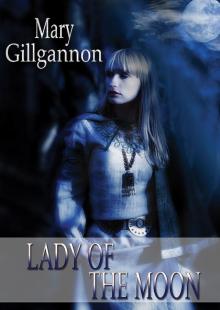 Lady of the Moon
Lady of the Moon Beyond the Sea Mist
Beyond the Sea Mist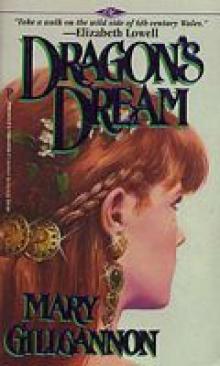 Dragon's Dream
Dragon's Dream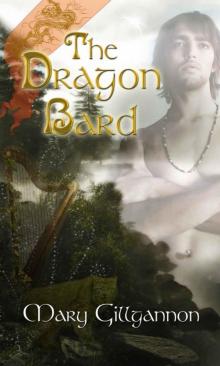 The Dragon Bard (Dragon of the Island)
The Dragon Bard (Dragon of the Island)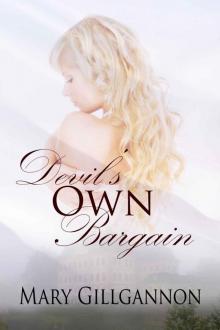 Devil's Own Bargain (London Lords)
Devil's Own Bargain (London Lords) Wicked Wager
Wicked Wager Dragon of the Island
Dragon of the Island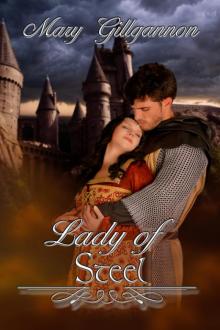 Lady of Steel
Lady of Steel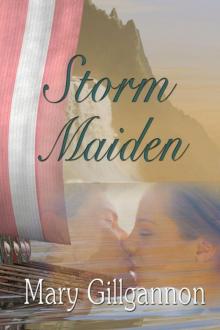 Storm Maiden
Storm Maiden The Dragon Prince
The Dragon Prince